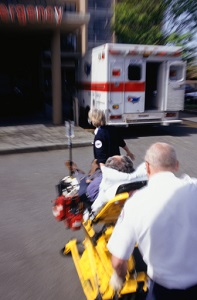Shock
 Shock is a medical emergency caused by low blood pressure and other problems in the body. It commonly occurs when someone suffers a serious injury or has a life-threatening infection. Shock is also sometimes used to refer to the numb, shocked emotional reaction people experience after a sudden loss or trauma.
Shock is a medical emergency caused by low blood pressure and other problems in the body. It commonly occurs when someone suffers a serious injury or has a life-threatening infection. Shock is also sometimes used to refer to the numb, shocked emotional reaction people experience after a sudden loss or trauma.
What is Shock?
Shock occurs when there’s not enough blood flowing through the body, usually due to low blood pressure. A number of conditions can cause the low blood pressure that leads to shock, including a sudden traumatic injury, a heart attack, an infection, allergic reactions, excessive bleeding, or dehydration. Shock is a medical emergency that requires immediate treatment, and symptoms include:
- Confusion, dizziness, and anxiety
- Cold or blue skin
- A rapid pulse that feels weak
- Excessive sweating
- Difficulty breathing
- Fainting and unconsciousness
Treatment typically includes treating the cause of the shock by administering cardiac care, stopping bleeding, or treating an infection. People in shock may also be administered fluids to help stabilize them. Sometimes people in shock do not experience pain that seems appropriate to their injuries, because the body is shutting down.
Shock and Mental Health
Shock tends to slow down the body’s reactions and lead to confusion or unconsciousness. In mental health, people sometimes use the term shock to refer to an emotional reaction that causes similar symptoms. People sometimes say they are in shock when they feel numb and unable to react to a sudden tragedy or trauma. People experiencing this kind of shock may also experience denial, difficulty thinking clearly, and a surprising lack of emotion.
Culture Shock
Social psychologists also use the term culture shock to refer to the overwhelming feelings a person may experience when they visit an unfamiliar culture. An unfamiliar culture could be a foreign country, a new school, a new working environment, or any other new setting that throws a person’s normal coping mechanisms into confusion.
References:
- Healing emotional and psychological trauma. (n.d.). Help Guide. Retrieved from http://www.helpguide.org/mental/emotional_psychological_trauma.htm
- Shock. (n.d.). U.S National Library of Medicine. Retrieved from http://www.nlm.nih.gov/medlineplus/ency/article/000039.htm
Last Updated: 08-25-2015
Leave a Comment
By commenting you acknowledge acceptance of GoodTherapy.org's Terms and Conditions of Use.
